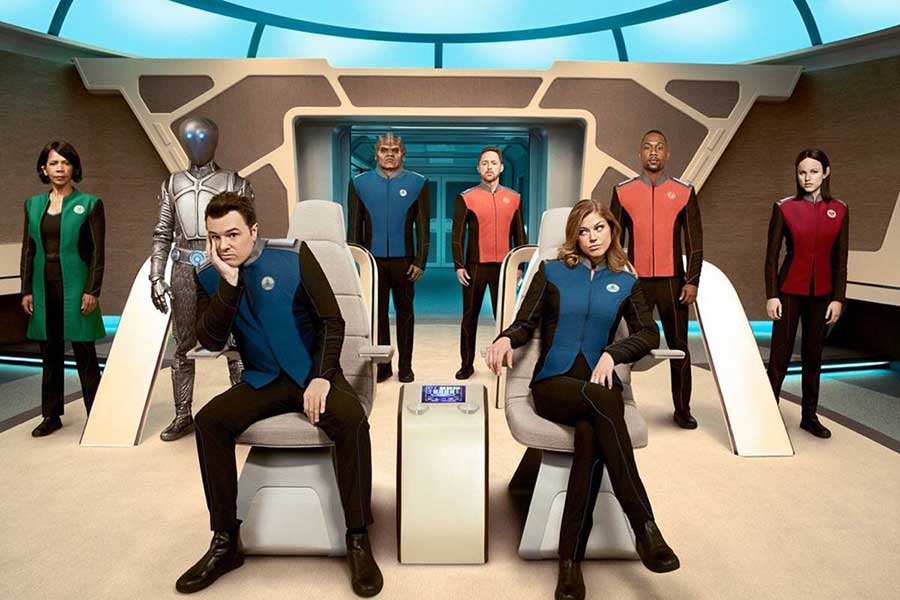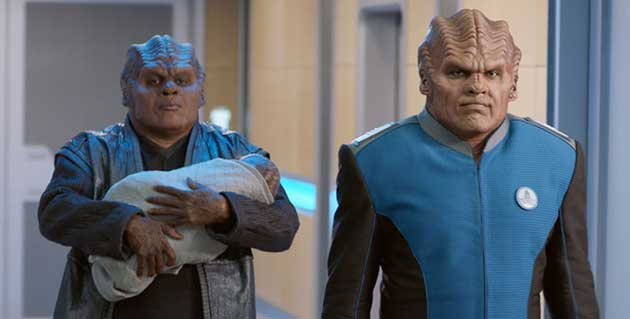Guest blogger: Joy Michael Ellison.
In case you missed it – or were trying to avoid it – The Orville is a new thinly-veiled Star Trek spoof created by (and starring) Seth MacFarlane. Yes, the creator of Family Guy is writing sci-fi. At first, I thought the show was what I feared: it’s a little like your least favorite fan boy tried to write satire, but ended up spilling beer and heterosexuality everywhere. However, somewhere between the dick jokes (and there are a lot of dick jokes), MacFarlane decided to follow in Gene Rodenberry’s footsteps. In its third episode About a Girl, The Orville does what sci-fi does best: think through contemporary social issues. About a Girl provides commentary on intersex surgeries. The only problem is, MacFarlane doesn’t seem to know that’s what he’s doing.
Red alert: I’m about to boldly spoil this episode.
The Plot:
Bortus, a member of an all-male species that look like knock-off Klingons, and his partner Klyden learn that their newborn child has been assigned a female gender at birth. Bortus asks the ship’s doctor Claire Finn to operate to conform the baby’s gender to male. When Doctor Finn refuses to perform what she calls a “sex change,” Bortus contacts the Moclan authorities. The Moclans bring a ship to extradite the child and perform to procedure. Captain Ed Mercer refuses to allow the baby to leave the ship, citing ethical objections to the procedure. Then, Bortus has a change of heart. Because his partner Klyden still wants the procedure performed, the Moclan government holds a trial to determine what will happen to the baby. Meanwhile, Captain Ed Mercer finds the only woman on Moclus and brings her to the court room. The female Moclan reveals that she is, in fact, a famous Moclan writer. Despite her testimony, the court rules that the baby will be subjected to the surgery. The episode ends with Bortus and Klyden holding the child they now understand as their son.
The problem:
The mistake this episode makes might seem small, but it has huge implications: About a Girl conflates intersex identity with transgender identity. Captain Mercer says to Bortus, “You want to perform a transgender surgery on a baby?” In fact, Bortus isn’t asking for that at all. The procedure he is discussing has nothing to do with transgender-related gender affirming medical services. What Bortus initially requests is a non-consensual medical intervention that is performed on approximately 1 or 2 out of every 1,000 births. These people are intersex – they are born with genitals or reproductive anatomy that doesn’t seem to fit into the typical definitions of female or male. Intersex includes a range of conditions and is as common as red hair. The majority of intersex people are born without any life-threatening medical issues, yet they are subjected to medical interventions like the Moclan surgery without their consent.

Transgender and intersex people are both harmed by the same social concept: the idea that doctors have the authority to determine a person’s gender. However, the form that their oppression takes is different. Doctors operate on intersex people without their consent, while trans people are often denied the medical services they do want. This video by intersex activists explains what MacFarlane missed.
Perhaps the worst part of this episode is when Klyden reveals to Bortus that he is demanding surgery for his child because he was assigned a female gender at birth. Klyden says that he didn’t know until he had been assigned female until he was examined by a non-Moclan doctor. Experiences like this one aren’t uncommon for intersex people, many of whom are subjected to surgeries without their knowledge. However, Klyden’s support of the procedure is. Intersex people, through organizations like InterACT, are sharing their stories and many of them strongly object to non-consensual surgeries. Instead, they’re arguing that cosmetic surgeries should wait until intersex young people can decide for themselves.
The medical scenario created in this episode is, of course, science fiction. It operates under its own (largely unexplained) logic. Nonetheless, the concocted procedure has more in common with intersex surgeries than with transgender-related medical services. The distinction is important because intersex people are currently fighting to end non-consensual surgeries. This episode could have been helpful to their struggle, if it had only acknowledged their existence.
But wait, About a Girl is about disability too:
Besides conflating intersex and trans struggles, About a Girl also includes confused commentary on disability and sexism. Throughout the episode, characters draw analogies between ableism, sexism, and intersex oppression. “Moclans view the female gender as a handicap [sic.],” explains Captain Mercer. “Female is not an illness,” says commander Kelly Grayson. Bortus initially compares the surgery to reshaping a cleft palate. Later, Bortus bases his objections to surgery based on a somewhat anti-ableist stance he learned from watching “an old Earth movie,” Rudolph the Red Nosed Reindeer.
Bortus says, “Christmas would have been ruined if Rudolph had been euthanized at birth as his father wished…What was clearly a deformity became a supreme advantage. One can never know.” Bortus’ comment is played for laughs, but violence against disabled people is all too real. Furthermore, disabled people are valuable without inspiring able-bodied and able-minded people by turning our disabilities into advantages.
About a Girl addresses every form of oppression relevant to the situation it constructs, except the most relevant: intersex. These forms of oppression are interrelated, but About a Girl treats them as the same. By doing so, it neglects the specificity of system of domination. It also erases the experiences of people who are impacted by more than one oppression, like disabled intersex people, intersex people of color, or intersex people who are also transgender. This episode illustrates the need to account for how systems of oppression relate to each other structurally while intersecting in distinct ways in our lives.
There is one important, wonderful moment in this episode:
Captain Mercer asks Bortus, “Why not just let the kid decide for herself when she’s old enough?” The right to decide for ourselves is something disabled folks, intersex people, trans communities, and women are all fighting for. The right to bodily autonomy is part of what connects our struggles. If that’s the message that viewers take away from this episode, I’m happy.
The Orville is a much better show than I imagined it would be. I hope it continues to tackle contemporary social issues – and I hope they hire some writers and consultants from oppressed communities to help them out. There are lots of talented, informed people who would be happy to share knowledge about our lives. I know I would be.
If you want to learn more about intersex struggles, check out the amazing work of intersex activist Pidgeon Pagonis!
About Joy: Joy is a writer, a teacher and scholar, and a grassroots, community activist. They are interested in using stories, both fictional and true, to build community, document social movements, and imagine a liberated world. They are also the creator of “Defense Against the Orange Arts,” a Harry Potter themed activist how-to and news series. They believe that storytelling is integral to healing, transformation, resistance, and survival.
Would you like to support this blog? All contributors are paid a fair price for their work, and we can continue this with help from you! Visit our Patreon, or send a donation via PayPal. You can also share this post. We thank you for your support.


Thank you for this excellent article. I just watched this episode and I was really disappointed by it, and concerned by the way it conflated transgender identity, intersex rights and disability all into one thing. It was so backwards. None of the media outlets that covered it seemed to properly understand the problem. I stumbled across your site while reading about it, and I’m glad I did!